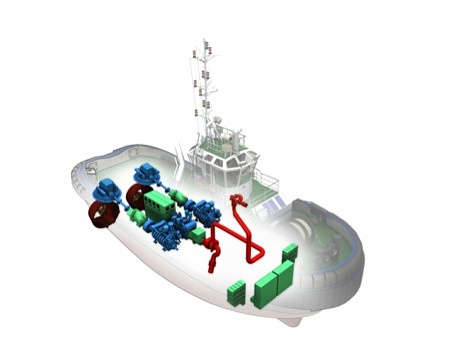The STW funded research program ShipDrive kicked-off recently with three PhD students at TU Delft to develop propulsion systems for ships that automatically combine electric and diesel power.
When driving a hybrid car, one doesn’t need to think whether to use the electric engine, the combustion engine or a combination of both. An advanced control system merges both power sources seamlessly, providing a smooth ride. The variable mix between electric and combustion engine power depends on speed, acceleration and the driver’s preferences.
“In the automotive industry the ‘equivalent cost minimisation approach’ has been honed to the limit”, says Rinze Geertsma MSc. He is one of the three PhD students at the 3mE Faculty working in the new ShipDrive research programme. Geertsma, who started his study at the Dutch Defense Academy in Den Helder, is also Lieutenant Commander in Engineering with the Royal Dutch Navy. His employer detached him to Delft for the length of the research.
Geertsma aims to develop control systems for hybrid ships that work just as smooth and effortless as the current automotive systems. But ships are more complex. Not only in the variety of drive systems, but also in the operations they perform.
Take a towboat for example. It has a very powerful diesel engine to tow ocean castles and oil tankers. But for sailing out or into the harbour, the ship only needs a fraction of its power. On such sections electric engines would suffice.
Environmental issues also play a role, such as low or no-emission zones in a city harbour, or noise limitations both above and under water.
A captain on a hybrid ship thus faces a range of choices during a typical working day depending on task, location and urgency. The automated system that ShipDrive envisions takes over the power switchboard and lets the captain focus on the operation.
Another PhD student, Ioana Georgescu MSc., will study the design choices in components for the power and propulsion installations. The third researcher will work on the transport of energy between the distributed ship systems. Think, for example, of a large ship with many electrically powered systems. An on-board smart energy management system may decide to delay heating and cooling tasks when the electric engines are in use.
ShipDrive technology may be useful in ship types that operate under widely varying circumstances. Towing boats are an example, as are cruise ships (floating hotels with their own power plant), offshore tenders (fast transfers alternated with waiting period) and dredgers (sailing and dredging).
“Those are the ships that Dutch wharfs have specialized in since the manufacture of bulk transport ships has been taken over by South Korea”, says Geertsma. “We need to concentrate on innovative and knowledge-intensive ships.”
TU researchers Klaas Visser MSc. (maritime technology) and Dr Rudy Negenborn (systems and control) supervise the project with Professors Hans Hopman (ship design) and Gabriel Lodewijks (transport systems).



Comments are closed.